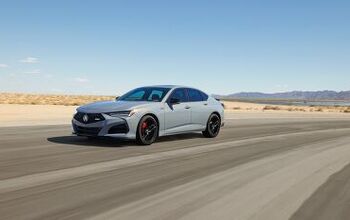Small Business Administration Keeping Closer Tabs on Loan Forgiveness

With enhanced scrutiny and plenty of differing opinions being heaped upon the government loans issued to help soften the economic impact of the coronavirus pandemic, the Small Business Administration (SBA) has signaled plans to conduct comprehensive investigations before offering any loan forgiveness. Under normal circumstances, one would expect that to be the typical course of action for all loans. But the scope of the Paycheck Protection Program (PPP) has complicated things.
Designed to provide a direct incentive for small businesses to keep workers on the payroll, the program earned heaps of criticism after millions of dollars were allocated to groups that didn’t exactly constitute small businesses. While the list is long, standouts include the Los Angles Lakers and Ruth’s Hospitality Group. We’re more interested in the United States’ largest new-vehicle retailers, AutoNation and Penske Automotive — both of which received millions via the SBA’s Paycheck Protection Program.
Responding to criticism, AutoNation announced it would return the $77 million in loans last Thursday. It also planned to cancel all of its existing loan applications. Penske beat it to the punch by one day, doing the same while making itself look slightly better by beating updated guidance from the SBA requiring all “large businesses” to certify they have a valid need for funding through the coronavirus relief package.
While neither really fit the definition of a small business, many complained that such companies employ sizable numbers and should be given aid when needed. Of course, the counterpoint is that bigger businesses often have robust cash reserves that must be taken into account — which sounds like something the Department of the Treasury would like to see happen.
On Tuesday, Treasury Secretary Steven Mnuchin said the SBA will critically examine all PPP loans valued at more than $2 million. Bemoaning the fact that the second most-valuable NBA franchise in existence (the LA Lakers) managed to snag $4.6 million on CNBC, Mnuchin said he was glad to see them return the money — suggesting they’d otherwise be open to legal ramifications. He said the same about AutoNation.
So what happened? Well, the government started offering free money and everyone wanted some. The original $349 billion forgivable loan program exhausted its funds sooner than anyone expected; President Donald Trump has since signed a $484 billion spending package that dumps another $321 billion into the Paycheck Protection Program. However, that new round of funding isn’t expected to last more than a couple of weeks. Hopefully that sees the U.S. through the worst of the economic strain caused by the pandemic, as most of the automotive industry plans on relaunching production by mid-May.
[Image: Casimiro PT/Shutterstock]

A staunch consumer advocate tracking industry trends and regulation. Before joining TTAC, Matt spent a decade working for marketing and research firms based in NYC. Clients included several of the world’s largest automakers, global tire brands, and aftermarket part suppliers. Dissatisfied with the corporate world and resentful of having to wear suits everyday, he pivoted to writing about cars. Since then, that man has become an ardent supporter of the right-to-repair movement, been interviewed on the auto industry by national radio broadcasts, driven more rental cars than anyone ever should, participated in amateur rallying events, and received the requisite minimum training as sanctioned by the SCCA. Handy with a wrench, Matt grew up surrounded by Detroit auto workers and managed to get a pizza delivery job before he was legally eligible. He later found himself driving box trucks through Manhattan, guaranteeing future sympathy for actual truckers. He continues to conduct research pertaining to the automotive sector as an independent contractor and has since moved back to his native Michigan, closer to where the cars are born. A contrarian, Matt claims to prefer understeer — stating that front and all-wheel drive vehicles cater best to his driving style.
More by Matt Posky
Latest Car Reviews
Read moreLatest Product Reviews
Read moreRecent Comments
- 3-On-The-Tree My 2009 C6 corvette in black looks great when it’s all washed and waxed but after driving down my 1.3 mile long dirt road it’s a dust magnet. I like white because dust doesn’t how up easily. Both my current 2021 Tundra and previous 2014 Ford F-150 3.5L Ecobomb are white
- Bd2 Would be sweet on a Telluride.
- Luke42 When will they release a Gladiator 4xe?I don’t care what color it is, but I do care about being able to plug it in.
- Bd2 As I have posited here numerous times; the Hyundai Pony Coupe of 1974 was the most influential sports and, later on, supercar template. This Toyota is a prime example of Hyundai's primal influence upon the design industry. Just look at the years, 1976 > 1974, so the numbers bear Hyundai out and this Toyota is the copy.
- MaintenanceCosts Two of my four cars currently have tires that have remaining tread life but 2017 date codes. Time for a tire-stravaganza pretty soon.


































Comments
Join the conversation
Did GM, FIAT and Ford also apply for that loan? The Big 3 is not big anymore. I would call them rather Small 3.
You’ve made my day. FB has a winger friend with that video “FB censors” outrage. I follow a TTAC time waster link on PPP loans (my bank would not take any, so of interest) and I get the debunk on the winger friend’s unhappy about censorship video. The internet is now officially a circle. edit:removed a nonprofane/nonsexist/nonracial word the TTAC filter dislikes.